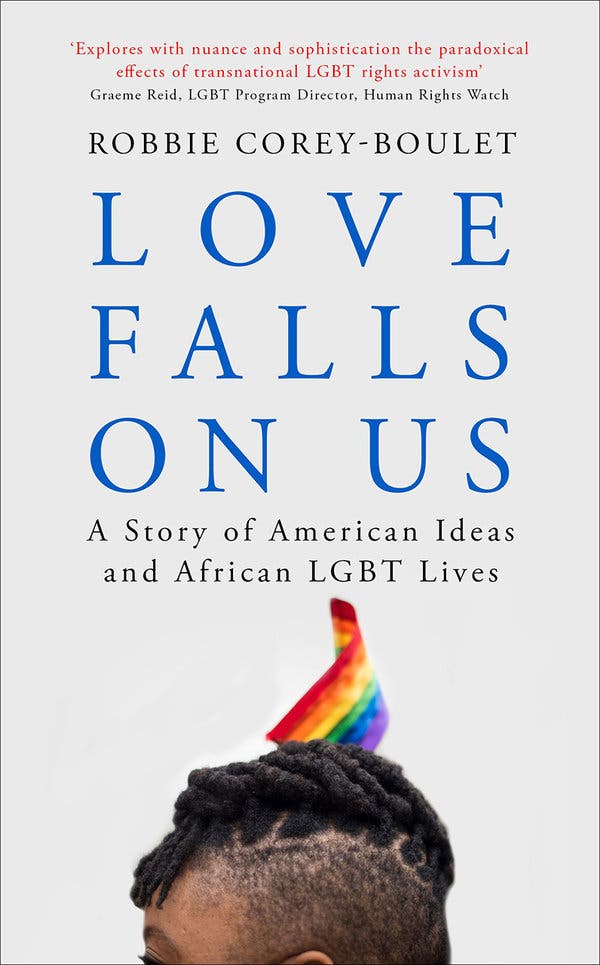LOVE FALLS ON US
A Story of American Ideas and African L.G.B.T. Lives
By Robbie Corey-Boulet
On International Human Rights Day, in December 2011, Hillary Clinton gave a monumental speech at the United Nations in Geneva, declaring that “gay rights are human rights, and human rights are gay rights.” Largely directed toward the African countries in which homosexuality was then — and, in some places, still is — viewed as a crime punishable by death, her words were met with overwhelmingly positive reactions in the West, where a growing popular support for L.G.B.T.Q. issues has emerged after decades of public struggle for equality. Across Africa, however, the speech may have had unintended negative consequences for L.G.B.T.Q. communities that have created spaces for themselves “underground, and out of sight.”
The journalist Robbie Corey-Boulet’s timely book, “Love Falls on Us,” addresses the complicated relationship between African L.G.B.T.Q. activists and an American foreign policy whose shifts on gay rights have in many cases exacerbated their difficulties by shining a global spotlight on otherwise unnoticed ways of living. Wisely avoiding the temptation to write about queer relationships across the entire continent, Corey-Boulet instead focuses on activists and individuals in three countries — Cameroon, Ivory Coast and Liberia — highlighting the peculiarities of their respective political and cultural contexts.

From the outset Corey-Boulet makes it clear that his book is a series of snapshots rather than a single, generalized picture of gay life across an often maligned and misunderstood continent. He is painfully aware of the common errors many writers and journalists make when covering Africa — “the mistake inherent in conceiving of sexual minorities in one city, or one country, or anywhere, as a kind of monolith” — and studiously avoids their hierarchical language and stereotypes. Instead, he humanizes his subjects by revealing the complexities and variations among L.G.B.T.Q. lives, whether closeted or not. A Cameroonian man named Lambert, who’d first experimented with anal sex at 13, later finds himself in a relationship with an older Frenchman who “exposed him to the possibilities of gay life in places where homophobia was less prevalent.” Another, Roger, H.I.V.-positive and eager to pursue a master’s degree, is arrested and abused for sending a homoerotic text message.
“Love Falls on Us” deepens our understanding of these lives beyond the persecution described in Western media. In his descriptions of nightlife at the once-gay-friendly Victoire Bar in Cameroon’s capital, Yaoundé — raided in 2005 by the police — and of a beach party celebrating the Transgender Day of Remembrance outside Monrovia, Liberia, Corey-Boulet’s writing stands out for its awareness of just how politically important it is to avoid sensationalizing minority life, and to display its full range. As Lambert, an L.G.B.T.Q. activist, puts it, “Human rights feeds on horror.” Corey-Boulet explains that in Lambert’s experience, “support from international activists is most readily available when the chances for spectacle and for scoring political points are highest.”
Corey-Boulet and the activists he profiles are pointedly critical of the well-meaning Westerners — including the pro-L.G.B.T. Obama administration — who have approached yet another global issue with a colonial mind-set, not allowing Africans “to discuss the issue on their own terms, but instead to respond to what Westerners were doing and saying.” Even Corey-Boulet’s own work, however, could be more inclusive, since he tends to include more male-identifying voices than female-identifying and lesbian voices, perhaps skewing our sense of the struggles some groups have faced in these environments.
That said, any book this ambitious in its attempt to capture a movement through unique “nonconformist” experiences is bound to have shortcomings. Corey-Boulet’s work more than rises to the challenge by elevating the extraordinary ordinariness of L.G.B.T.Q. Africans who are trying to live full, peaceful and free lives in the places they call home.
 EU News Digest Latest News & Updates
EU News Digest Latest News & Updates



